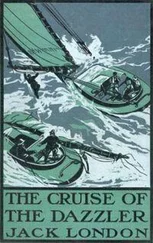Jack London - The Cruise of the Snark
Здесь есть возможность читать онлайн «Jack London - The Cruise of the Snark» весь текст электронной книги совершенно бесплатно (целиком полную версию без сокращений). В некоторых случаях можно слушать аудио, скачать через торрент в формате fb2 и присутствует краткое содержание. Жанр: Классическая проза, Морские приключения, на английском языке. Описание произведения, (предисловие) а так же отзывы посетителей доступны на портале библиотеки ЛибКат.
- Название:The Cruise of the Snark
- Автор:
- Жанр:
- Год:неизвестен
- ISBN:нет данных
- Рейтинг книги:3 / 5. Голосов: 1
-
Избранное:Добавить в избранное
- Отзывы:
-
Ваша оценка:
- 60
- 1
- 2
- 3
- 4
- 5
The Cruise of the Snark: краткое содержание, описание и аннотация
Предлагаем к чтению аннотацию, описание, краткое содержание или предисловие (зависит от того, что написал сам автор книги «The Cruise of the Snark»). Если вы не нашли необходимую информацию о книге — напишите в комментариях, мы постараемся отыскать её.
The Cruise of the Snark — читать онлайн бесплатно полную книгу (весь текст) целиком
Ниже представлен текст книги, разбитый по страницам. Система сохранения места последней прочитанной страницы, позволяет с удобством читать онлайн бесплатно книгу «The Cruise of the Snark», без необходимости каждый раз заново искать на чём Вы остановились. Поставьте закладку, и сможете в любой момент перейти на страницу, на которой закончили чтение.
Интервал:
Закладка:
CHAPTER VIII—THE HOUSE OF THE SUN
There are hosts of people who journey like restless spirits round and about this earth in search of seascapes and landscapes and the wonders and beauties of nature. They overrun Europe in armies; they can be met in droves and herds in Florida and the West Indies, at the Pyramids, and on the slopes and summits of the Canadian and American Rockies; but in the House of the Sun they are as rare as live and wriggling dinosaurs. Haleakala is the Hawaiian name for "the House of the Sun." It is a noble dwelling, situated on the Island of Maui; but so few tourists have ever peeped into it, much less entered it, that their number may be practically reckoned as zero. Yet I venture to state that for natural beauty and wonder the nature-lover may see dissimilar things as great as Haleakala, but no greater, while he will never see elsewhere anything more beautiful or wonderful. Honolulu is six days' steaming from San Francisco; Maui is a night's run on the steamer from Honolulu; and six hours more if he is in a hurry, can bring the traveller to Kolikoli, which is ten thousand and thirty-two feet above the sea and which stands hard by the entrance portal to the House of the Sun. Yet the tourist comes not, and Haleakala sleeps on in lonely and unseen grandeur.
Not being tourists, we of the Snark went to Haleakala. On the slopes of that monster mountain there is a cattle ranch of some fifty thousand acres, where we spent the night at an altitude of two thousand feet. The next morning it was boots and saddles, and with cow-boys and pack-horses we climbed to Ukulele, a mountain ranch- house, the altitude of which, fifty-five hundred feet, gives a severely temperate climate, compelling blankets at night and a roaring fireplace in the living-room. Ukulele, by the way, is the Hawaiian for "jumping flea" as it is also the Hawaiian for a certain musical instrument that may be likened to a young guitar. It is my opinion that the mountain ranch-house was named after the young guitar. We were not in a hurry, and we spent the day at Ukulele, learnedly discussing altitudes and barometers and shaking our particular barometer whenever any one's argument stood in need of demonstration. Our barometer was the most graciously acquiescent instrument I have ever seen. Also, we gathered mountain raspberries, large as hen's eggs and larger, gazed up the pasture- covered lava slopes to the summit of Haleakala, forty-five hundred feet above us, and looked down upon a mighty battle of the clouds that was being fought beneath us, ourselves in the bright sunshine.
Every day and every day this unending battle goes on. Ukiukiu is the name of the trade-wind that comes raging down out of the north- east and hurls itself upon Haleakala. Now Haleakala is so bulky and tall that it turns the north-east trade-wind aside on either hand, so that in the lee of Haleakala no trade-wind blows at all. On the contrary, the wind blows in the counter direction, in the teeth of the north-east trade. This wind is called Naulu. And day and night and always Ukiukiu and Naulu strive with each other, advancing, retreating, flanking, curving, curling, and turning and twisting, the conflict made visible by the cloud-masses plucked from the heavens and hurled back and forth in squadrons, battalions, armies, and great mountain ranges. Once in a while, Ukiukiu, in mighty gusts, flings immense cloud-masses clear over the summit of Haleakala; whereupon Naulu craftily captures them, lines them up in new battle-formation, and with them smites back at his ancient and eternal antagonist. Then Ukiukiu sends a great cloud-army around the eastern-side of the mountain. It is a flanking movement, well executed. But Naulu, from his lair on the leeward side, gathers the flanking army in, pulling and twisting and dragging it, hammering it into shape, and sends it charging back against Ukiukiu around the western side of the mountain. And all the while, above and below the main battle-field, high up the slopes toward the sea, Ukiukiu and Naulu are continually sending out little wisps of cloud, in ragged skirmish line, that creep and crawl over the ground, among the trees and through the canyons, and that spring upon and capture one another in sudden ambuscades and sorties. And sometimes Ukiukiu or Naulu, abruptly sending out a heavy charging column, captures the ragged little skirmishers or drives them skyward, turning over and over, in vertical whirls, thousands of feet in the air.
But it is on the western slopes of Haleakala that the main battle goes on. Here Naulu masses his heaviest formations and wins his greatest victories. Ukiukiu grows weak toward late afternoon, which is the way of all trade-winds, and is driven backward by Naulu. Naulu's generalship is excellent. All day he has been gathering and packing away immense reserves. As the afternoon draws on, he welds them into a solid column, sharp-pointed, miles in length, a mile in width, and hundreds of feet thick. This column he slowly thrusts forward into the broad battle-front of Ukiukiu, and slowly and surely Ukiukiu, weakening fast, is split asunder. But it is not all bloodless. At times Ukiukiu struggles wildly, and with fresh accessions of strength from the limitless north-east, smashes away half a mile at a time of Naulu's column and sweeps it off and away toward West Maui. Sometimes, when the two charging armies meet end- on, a tremendous perpendicular whirl results, the cloud-masses, locked together, mounting thousands of feet into the air and turning over and over. A favourite device of Ukiukiu is to send a low, squat formation, densely packed, forward along the ground and under Naulu. When Ukiukiu is under, he proceeds to buck. Naulu's mighty middle gives to the blow and bends upward, but usually he turns the attacking column back upon itself and sets it milling. And all the while the ragged little skirmishers, stray and detached, sneak through the trees and canyons, crawl along and through the grass, and surprise one another with unexpected leaps and rushes; while above, far above, serene and lonely in the rays of the setting sun, Haleakala looks down upon the conflict. And so, the night. But in the morning, after the fashion of trade-winds, Ukiukiu gathers strength and sends the hosts of Naulu rolling back in confusion and rout. And one day is like another day in the battle of the clouds, where Ukiukiu and Naulu strive eternally on the slopes of Haleakala.
Again in the morning, it was boots and saddles, cow-boys, and packhorses, and the climb to the top began. One packhorse carried twenty gallons of water, slung in five-gallon bags on either side; for water is precious and rare in the crater itself, in spite of the fact that several miles to the north and east of the crater-rim more rain comes down than in any other place in the world. The way led upward across countless lava flows, without regard for trails, and never have I seen horses with such perfect footing as that of the thirteen that composed our outfit. They climbed or dropped down perpendicular places with the sureness and coolness of mountain goats, and never a horse fell or baulked.
There is a familiar and strange illusion experienced by all who climb isolated mountains. The higher one climbs, the more of the earth's surface becomes visible, and the effect of this is that the horizon seems up-hill from the observer. This illusion is especially notable on Haleakala, for the old volcano rises directly from the sea without buttresses or connecting ranges. In consequence, as fast as we climbed up the grim slope of Haleakala, still faster did Haleakala, ourselves, and all about us, sink down into the centre of what appeared a profound abyss. Everywhere, far above us, towered the horizon. The ocean sloped down from the horizon to us. The higher we climbed, the deeper did we seem to sink down, the farther above us shone the horizon, and the steeper pitched the grade up to that horizontal line where sky and ocean met. It was weird and unreal, and vagrant thoughts of Simm's Hole and of the volcano through which Jules Verne journeyed to the centre of the earth flitted through one's mind.
Читать дальшеИнтервал:
Закладка:
Похожие книги на «The Cruise of the Snark»
Представляем Вашему вниманию похожие книги на «The Cruise of the Snark» списком для выбора. Мы отобрали схожую по названию и смыслу литературу в надежде предоставить читателям больше вариантов отыскать новые, интересные, ещё непрочитанные произведения.
Обсуждение, отзывы о книге «The Cruise of the Snark» и просто собственные мнения читателей. Оставьте ваши комментарии, напишите, что Вы думаете о произведении, его смысле или главных героях. Укажите что конкретно понравилось, а что нет, и почему Вы так считаете.







